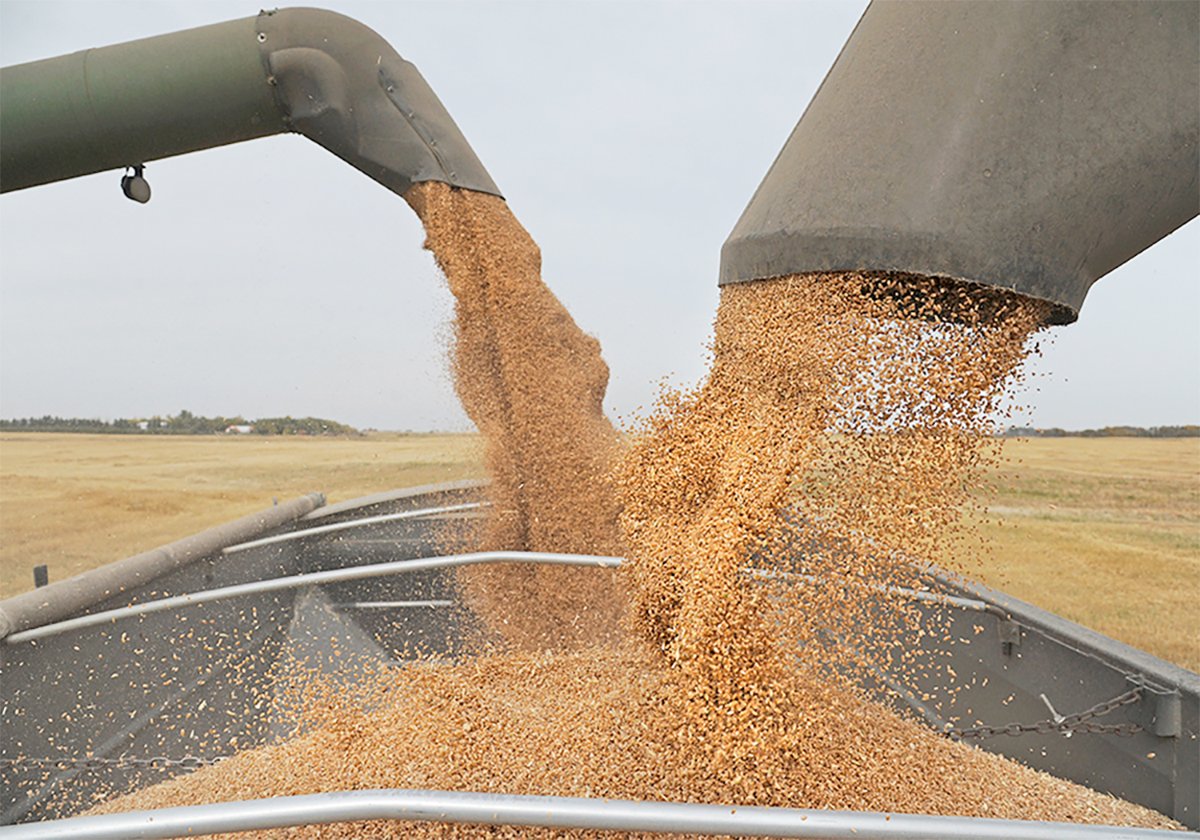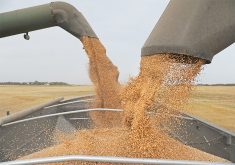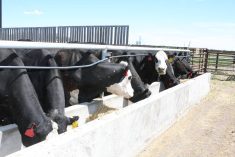Bad agreements
Thinking farmers and urbanites realize that the aid packages offered to the BSE-affected farming community seem mainly to have benefited the bottom line of the processors and packers, with little filtering down to producers.
Both the federal Liberals and (Alberta premier Ralph) Klein’s provincial Conservatives offered seemingly flawed aid packages now requiring investigations to determine why these tax dollars did not reach those the spin doctors led us to believe were to receive relief.
The much publicized investigation being conducted by the all party agricultural committee, headed by MP David Kilgour, had its suggestion of fining packers $250,000 per day for contempt of Parliament for not turning their books over for review, was shot down by Mr. Harper’s Conservatives….
Read Also

Agriculture productivity can be increased with little or no cost
There’s a way to enhance agricultural productivity with little or no cost. It doesn’t even require a bunch of legislative changes.
These same corporations don’t hesitate to accept Canadian taxpayer funds, which they can readily transfer to their foreign headquarters, leaving their Canadian entities immune to interference by some lowly government representatives. So much for the lost sovereignty the Free Trade Agreement and the North American Free Trade Agreement have accomplished.
Neither the Liberals, Conservatives, nor the NDP have the intestinal fortitude to reclaim the sovereignty lost by simply offering to abrogate these agreements….
Without this action being taken, Canadians will see their water, oil, gas, forestry, agriculture, environment, health care and energy sectors continue to be targets for corporate control while our legislators remain powerless to act on behalf of Canadians. …
– Vern Bretin,
Leduc, Alta.
Health worry
The debate over intensive livestock operations has been raging in this area for quite some time….
Between this and the past dispute in McAuley, I became concerned with the immediate effects that the hog barns would have on my family and the surrounding area. As a result, I started to research the topic to form my own opinions and I ended up doing an essay on the topic for my Grade 10 science class. …
At the last council meeting, an ILO application was accepted by the RM of Moosomin to have an earthen lagoon, with no cover, placed two miles from my house. Within a two-mile radius, eight other children will be exposed to the contaminates of this hog barn.
… The American Public Health Moratorium states “children suffer disproportionately from asthma; while fetuses, infants and children are more vulnerable to adverse impacts from bacterial and antimicrobial-resistant infections, all health impacts to which existing science suggests that emissions from ILOs may contribute.”
This issue not only has created problems and put a huge gap in our community, but it is now posing a serious threat to children of my community.
I don’t think that it is too much to ask for the people to stop and think about the consequences of their actions and think of how our lives can be affected.
We have a bright future ahead of us but the contaminates from this hog barn may alter this course considerably. Is the extra dollar in a few men’s pockets worth a child’s future?
– Kassandra Shaw,
Moosomin, Sask.
One law
The licensing part of the Canadian Wheat Board Act mandates the administration of the CWB to issue export licences to all wheat and wheat products, barley and barley products exported from Canada.
Everything, from raw grain to frozen pizza dough. Every load is covered by an export licence, and every pound is accounted for by the CWB administration at prairie farmers’ expense.
This single mandate is split into two policies. If the wheat or barley is grown on the Prairies, then the board denies you a licence until you sell your grain to the board at the initial price, then buy it back at the CWB imposed price.
If the wheat or barley is grown anywhere else, then the licence is granted on request.
It is this issue of one country, one law, two policies that has caused so much frustration to farmers. It has nothing to do with marketing by the board or if the single desk buying is the greatest socialist program in the world or the marketing scheme from hell.
The issue is the CWB’s refusal to have a national licensing policy applied equally across the country.
It should be clearly understood that it is the policy of denying licences to prairie farmers that gives the CWB its monopoly….
Now, the government of Alberta has introduced a private member’s bill to amend the wheat and barley test open market act to set a date that the test open market would be proclaimed into law. The CWB will continue to distract, deflect or discredit any and all attempts to deal with the licensing issue in public and especially in court.
There is one question to be answered after the Alberta legislation is in place. Will the federal government continue to allow CWB policy to deny Alberta farmers equal treatment or will they apply the existing federal law equally across the country?
– Doug McBain,
President, Western Barley Growers Association,
Cremona, Alta.
Farmer rights
In today’s strongly protected and regulated world there is still one group of people who are hanging onto their rights: western Canadian farmers.
Following is a summary of some of the most important rights a Canadian farmer still has:
You have the right to work your butt off when preparing, seeding and harvesting your land, although you don’t own it.
You have the right to spend thousands of bucks, the more the better, for seed, fertilizer and crop protection products.
You have the right to sell your crop to the highest bidder, which is still way below your cost.
You have the right to pay up to $69 per hour for an automotive or implement repair….
You have the right to raise livestock and sell your yearling calves to one of the local stockyards for 52 cents per pound live weight. The livestock buyers and processors really appreciate your commitment in supporting them so they can raise their retail price again.
As an alternative you may consider donating your cattle to the livestock industry. Doing this, you save money for transport and marketing through the auctioneers. Now that you have additional funding on hand you’ll be able to buy more cattle.
You have the right to support the local economy, pay your yearly increasing taxes and remain silent, because you are living in such a great prosperous community….
You have the right to file for bankruptcy ….
Or you have the right not to be a farmer anymore. Maybe you consider going to a Third World country like Africa and work as a labourer, which some people still name slaves. In most cases, they feed you and you have a roof over your head. But why do that? Isn’t this what you already have here?
One day in a not so far future, people will realize they can neither eat products like cell phones or computers nor drink oil.
It is time to make a major decision for our common future now.
Best wishes from an unprotected species commonly known as the Canadian farmer, at the edge of extinction.
– Bert Jochymski,
Melville, Sask.
Smart dogs
Re: Are dogs smart enough to vote?
Barb Glen’s column of June 24, about smart dogs, especially her farm dog that knew which cars to bark at by memorizing the licence plate numbers, reminds me of some smart cows.
A dairy farmer had a city cousin visiting for a few days. After watching several times as the cows entered the barn for milking, the city fellow expressed amazement that the cows were sufficiently intelligent that each one always went directly to her own stall.
“Oh, they’re not all that smart,” replied the farmer. “You see, each cow has her name card up over her stall.”
I accept that a dog, which quickly learns all of the cowboy cuss words, has displayed considerable intelligence. However, I assume the cowboy was merely cussing in English.
Margot, our next-door neighbour, is German while Denis, her hubby, is English. They once had a pair of small poodle dogs that were bilingual, understanding both German and English words.
Of course one must remain slightly skeptical about the apparent superior intelligence of these dogs, for it is always possible that they had, at some time, shared a kennel with a German shepherd.
Having myself struggled for almost seven decades to just partially master only English, I am in awe of human or beast which is able to understand two or more languages, especially some which seem to me to be extraordinarily difficult.
It is the dog which belongs to the oriental family who live behind us that I believe displays true genius. I hear them saying, “sit, Sit, SIT, SIT, SIT” with no apparent result.
Then I hear a sharp phrase spoken in Chinese, to which the dog responds immediately.
Any dog that knows Chinese is one clever puppy. Not only smart enough to vote, it could probably be an above average Member of Parliament.
It gets my vote.
– Allan Liggins,
Coquitlam, B.C.
Organics fan
I am writing this letter in response to Brenda Cassidy of the Food and Safety Network, University of Guelph, who wrote a letter in the Jan. 22 issue.
She says anti-GM groups are trying to achieve a ban on genetically modified foods through ongoing campaigns to create consumer fear.
Excuse me, but consumers are not stupid and don’t need a campaign to create fear in them. They already have a very deep-seated fear and mistrust of … genetically altered grains, which require massive amounts of pesticide poison to be sprayed on them. …
She says there is little difference between organic fruits, vegetables and grains and GM foods as they have the same nutrients.
I do not buy organic foods so much for what is in them as I do for what is not in them. What is not in them is poison, genetic modifications and the destruction of the air and the ground these foods were grown in. She also says there is no difference in taste. I can tell right there that she has not eaten organic fruit or vegetables because as a consumer who does buy organic I can testify to the fact that these foods do taste better – maybe not quite as good as in your grandmother’s garden but definitely better than mass produced non organic food.
I really wish these university educated people who are working for big bucks would stop treating the consumers like we don’t know what we like or want.
What we want is clean air, food and water and science will not give us any of these. Indeed science has created many of the pollutants that are troubling our earth today and are virtually impossible to clean up.
– Warren Line,
Regina, Sask.














